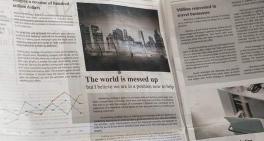Court boosts rights of students accused of sexual misconduct
Supreme Court News
Students accused of sexual misconduct at public universities have the right to cross-examine accusers at disciplinary hearings, a federal appeals court said Friday in a sweeping decision that will extend to public schools in four states.
The University of Michigan violated the rights of a male student by refusing to allow him or a representative to question witnesses in an alleged incident of sexual misconduct at a "Risky Business"-themed fraternity party, the court said.
A university investigator found insufficient evidence that a student had committed misconduct. But that conclusion was overturned by a campus appeals panel after two closed sessions.
The student, identified in court papers as John Doe, agreed to leave the school in 2016 instead of face expulsion, just 13.5 credits shy of getting a bachelor's degree in business. His attorney said he was made a "scapegoat" by the university to show that it was aggressively responding to complaints.
"If a public university has to choose between competing narratives to resolve a case, the university must give the accused student or his agent an opportunity to cross-examine the accuser and adverse witnesses in the presence of a neutral fact-finder," said Judge Amul Thapar, writing for a three-judge panel at the 6th U.S. Circuit Court of Appeals.
The court overturned a decision by U.S. District Judge David Lawson. The ruling is binding in Michigan, Ohio, Tennessee and Kentucky, the four states covered by the 6th Circuit.
"Providing Doe a hearing with the opportunity for cross-examination would have cost the university very little," Thapar wrote. "As it turns out, the university already provides for a hearing with cross-examination in all misconduct cases other than those involving sexual assault."
University spokesman Rick Fitzgerald said the decision was being reviewed.
"This is a very huge victory for the constitutional rights of students," Doe's attorney, Deborah Gordon, said. "Sexual-misconduct proceedings have to be a search for the truth. The University of Michigan, by hiding the ball from both sides, has really done a huge disservice to the entire issue of sexual misconduct on campus. The stakes are so high."
It's unclear what will happen next. But Gordon said her client, who had a 3.94 grade-point average, wants his college degree.
Related listings
-
California high court rules for immigrant kids in visa fight
Supreme Court News 08/16/2018The California Supreme Court on Thursday made it easier for some immigrant children who are abused or abandoned by a parent to seek a U.S. visa to avoid deportation in a ruling that advocates said would help thousands of children.State judges cannot ...
-
Court document details moments before fatal police shooting
Supreme Court News 08/11/2018Investigators say a man fired gunshots into a bedroom wall and pointed a gun at his roommate before he was fatally shot by St. Paul police.A search warrant filed Tuesday by the Minnesota Bureau of Criminal Apprehension contains details about the mome...
-
Court, regulators clash over uranium project in South Dakota
Supreme Court News 08/03/2018Federal regulators recently abandoned a proposed survey of Native American cultural resources at a planned uranium mine site in the southwest part South Dakota, just days before a judge decided the survey is required by federal law.The contradictory ...

USCIS to Begin Accepting Applications under the International Entrepreneur Rule
U.S. Citizenship and Immigration Services (USCIS) announced today it is taking steps to implement the International Entrepreneur Rule (IER), in accordance with a recent court decision.
Although the IER was published during the previous administration with an effective date of July 17, 2017, it did not take effect because the Department of Homeland Security (DHS) issued a final rule on July 11, 2017, delaying the IER’s effective date until March 14, 2018. This delay rule was meant to give USCIS time to review the IER and, if necessary, to issue a rule proposing to remove the IER program regulations.
However, a Dec. 1, 2017, ruling from the U.S. District Court for the District of Columbia in National Venture Capital Association v. Duke vacated USCIS’ final rule to delay the effective date. The Dec. 1, 2017, court decision is a result of litigation filed in district court on Sept. 19, 2017, which challenged the delay rule.




